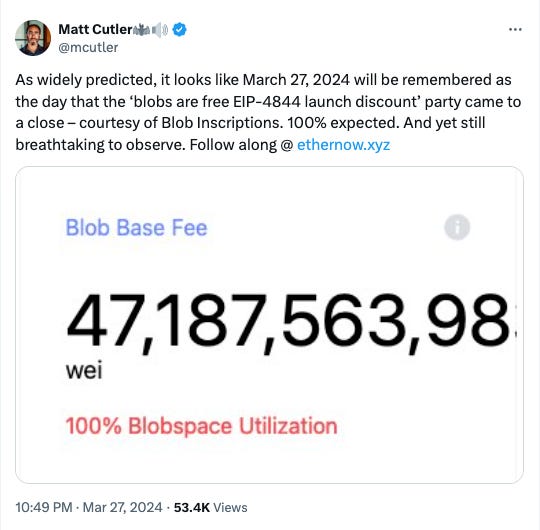What are Ethereum Blobs? 🅾️
Blobs are temporary memory units that carry data about transactions. We take a deeper look at this significant feature introduced to the Ethereum network as part of the Dencun upgrade.
Hello, y'all. If you think you know your music, then this is for you frens. A complete go. Check out 👉 Asset - Music Nerd
This is The Token Dispatch 🙌 you can hit us on telegram 🤟
Ethereum has long struggled with scalability.
Ethereum transactions can feel like rush hour traffic on a highway sometimes.
Transactions compete for limited block space, driving up fees.
But with the March 2024 Dencun upgrade, Ethereum introduced a game-changer: Ethereum blobs.
Read: Ethereum's Dencun Upgrade 🦋
What are Ethereum Blobs?
Designated off-ramps from the Ethereum highway.
Transactions can now store their bulky data (up to 128 kilobytes) in these blobs, freeing up space on the main network.
This data could be complex smart contract code, large files, or anything else a transaction needs to carry.
Here's the key difference: Unlike regular transaction data, blobs are not processed by the Ethereum Virtual Machine (EVM), the engine that executes smart contracts. So the main network is lean and efficient.
Read from Vitalik: Ethereum has blobs. Where do we go from here?
Benefits of Blobs
Reduced Transaction Fees: By offloading data storage to blobs, transactions become smaller and cheaper to send. This is especially beneficial for Layer 2 scaling solutions, which rely on Ethereum for security but handle most transactions off-chain.
Increased Scalability: Blobs free up valuable block space for more transactions, allowing Ethereum to handle a higher volume of activity.
Separation of Concerns: Blobs keep data storage separate from smart contract execution, potentially improving network efficiency and security in the long run.
How do Blobs Work?
EIP-4844: Blobs are part of a larger Ethereum Improvement Proposal (EIP) called EIP-4844, also known as proto-danksharding. EIP-4844 lays the groundwork for future sharding upgrades, another major scaling solution for Ethereum.
Blob Market: Users can include data in blobs for a fee. This fee is determined by a market mechanism within the protocol, ensuring efficient allocation of blob space.
Temporary Storage: Blobs are designed for temporary data storage. Currently, data is purged from blobs after one to two weeks, although this timeframe can be adjusted in the future.
The Blobscriptions Experiment and Beyond
"Blobs" were supposed to be a cheap way to store data.
And then, things got messy.
Enter Ethscriptions: This project jammed the blob space with "blobscriptions" - New method for minting data to the Ethereum.
Sounds cool but caused a huge fee spike on March 7.
Cheaper than Ethereum's main network, but way more than "free."
Luckily, they've since settled down to a more reasonable price.
Blobs on Ethereum are operating at full capacity with a 100% utilisation rate.
The good, the bad, and the blob
Good: BlobScriptions offer a fun way to interact with Ethereum.
Bad: The surge in demand is making it harder and pricier for others to use blobs.
Blob: We're not sure if BlobScriptions are a fad or a sign of things to come.
The Future of Blobs
Increased Blob Capacity: The current blob storage capacity is limited. Future upgrades are expected to increase this capacity significantly.
Rollup Integration: Developers are working on improving how rollups can leverage blobs for efficient data storage and retrieval.
Long-Term Storage Solutions: While blobs are not designed for permanent storage, solutions may emerge to link blobs to off-chain storage options.
Blobs have the potential to revolutionise areas like identity, reputation, and even governance. Ethereum is no longer just about money, it's a powerful alternative to centralised tech.
TTD Week That Was 📆
Saturday: Q1 Report card. A+ for Crypto 🙌
Friday: SBF Gets 25 ⛓️👮
Thursday: Coinbase > SEC < Beba 🤼♀️
Wednesday: Heat On For KuCoin 🌡️
Tuesday: Back Up And Running? 🪁
TTD Week in Funding 💰
Arrow Markets. $4 million. Democratising the entire options trading pipeline, from market making to brokering, to clearing and settlement.
Midas. $8.75 million. Asset tokenisation platform bringing exposure to institutional-grade assets on-chain.
FLock. $6 million. Decentralised, privacy-preserving solution for Artificial Intelligence.
If you like us, if you don't like us .. either ways do tell us✌️
If you dig what we do, show us love on Twitter, Instagram & Threads🤞
So long. OKAY? ✋








